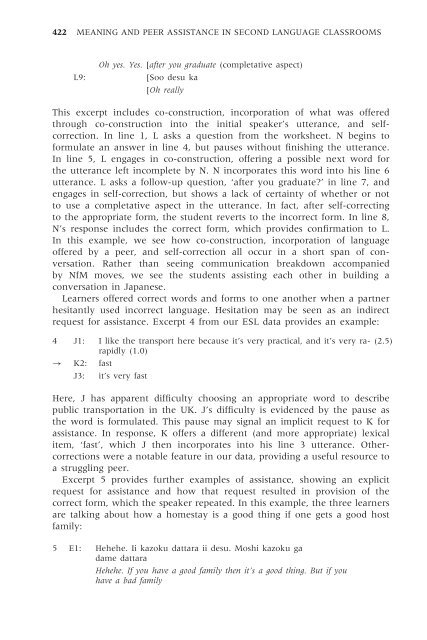Negotiation for Meaning and Peer Assistance in Second Language ...
Negotiation for Meaning and Peer Assistance in Second Language ...
Negotiation for Meaning and Peer Assistance in Second Language ...
You also want an ePaper? Increase the reach of your titles
YUMPU automatically turns print PDFs into web optimized ePapers that Google loves.
422 MEANING AND PEER ASSISTANCE IN SECOND LANGUAGE CLASSROOMS<br />
Oh yes. Yes. [after you graduate (completative aspect)<br />
L9: [Soo desu ka<br />
[Oh really<br />
This excerpt <strong>in</strong>cludes co-construction, <strong>in</strong>corporation of what was offered<br />
through co-construction <strong>in</strong>to the <strong>in</strong>itial speaker’s utterance, <strong>and</strong> selfcorrection.<br />
In l<strong>in</strong>e 1, L asks a question from the worksheet. N beg<strong>in</strong>s to<br />
<strong>for</strong>mulate an answer <strong>in</strong> l<strong>in</strong>e 4, but pauses without f<strong>in</strong>ish<strong>in</strong>g the utterance.<br />
In l<strong>in</strong>e 5, L engages <strong>in</strong> co-construction, offer<strong>in</strong>g a possible next word <strong>for</strong><br />
the utterance left <strong>in</strong>complete by N. N <strong>in</strong>corporates this word <strong>in</strong>to his l<strong>in</strong>e 6<br />
utterance. L asks a follow-up question, ‘after you graduate?’ <strong>in</strong> l<strong>in</strong>e 7, <strong>and</strong><br />
engages <strong>in</strong> self-correction, but shows a lack of certa<strong>in</strong>ty of whether or not<br />
to use a completative aspect <strong>in</strong> the utterance. In fact, after self-correct<strong>in</strong>g<br />
to the appropriate <strong>for</strong>m, the student reverts to the <strong>in</strong>correct <strong>for</strong>m. In l<strong>in</strong>e 8,<br />
N’s response <strong>in</strong>cludes the correct <strong>for</strong>m, which provides confirmation to L.<br />
In this example, we see how co-construction, <strong>in</strong>corporation of language<br />
offered by a peer, <strong>and</strong> self-correction all occur <strong>in</strong> a short span of conversation.<br />
Rather than see<strong>in</strong>g communication breakdown accompanied<br />
by NfM moves, we see the students assist<strong>in</strong>g each other <strong>in</strong> build<strong>in</strong>g a<br />
conversation <strong>in</strong> Japanese.<br />
Learners offered correct words <strong>and</strong> <strong>for</strong>ms to one another when a partner<br />
hesitantly used <strong>in</strong>correct language. Hesitation may be seen as an <strong>in</strong>direct<br />
request <strong>for</strong> assistance. Excerpt 4 from our ESL data provides an example:<br />
4 J1: I like the transport here because it’s very practical, <strong>and</strong> it’s very ra- (2.5)<br />
rapidly (1.0)<br />
! K2: fast<br />
J3: it’s very fast<br />
Here, J has apparent difficulty choos<strong>in</strong>g an appropriate word to describe<br />
public transportation <strong>in</strong> the UK. J’s difficulty is evidenced by the pause as<br />
the word is <strong>for</strong>mulated. This pause may signal an implicit request to K <strong>for</strong><br />
assistance. In response, K offers a different (<strong>and</strong> more appropriate) lexical<br />
item, ‘fast’, which J then <strong>in</strong>corporates <strong>in</strong>to his l<strong>in</strong>e 3 utterance. Othercorrections<br />
were a notable feature <strong>in</strong> our data, provid<strong>in</strong>g a useful resource to<br />
a struggl<strong>in</strong>g peer.<br />
Excerpt 5 provides further examples of assistance, show<strong>in</strong>g an explicit<br />
request <strong>for</strong> assistance <strong>and</strong> how that request resulted <strong>in</strong> provision of the<br />
correct <strong>for</strong>m, which the speaker repeated. In this example, the three learners<br />
are talk<strong>in</strong>g about how a homestay is a good th<strong>in</strong>g if one gets a good host<br />
family:<br />
5 E1: Hehehe. Ii kazoku dattara ii desu. Moshi kazoku ga<br />
dame dattara<br />
Hehehe. If you have a good family then it’s a good th<strong>in</strong>g. But if you<br />
have a bad family














